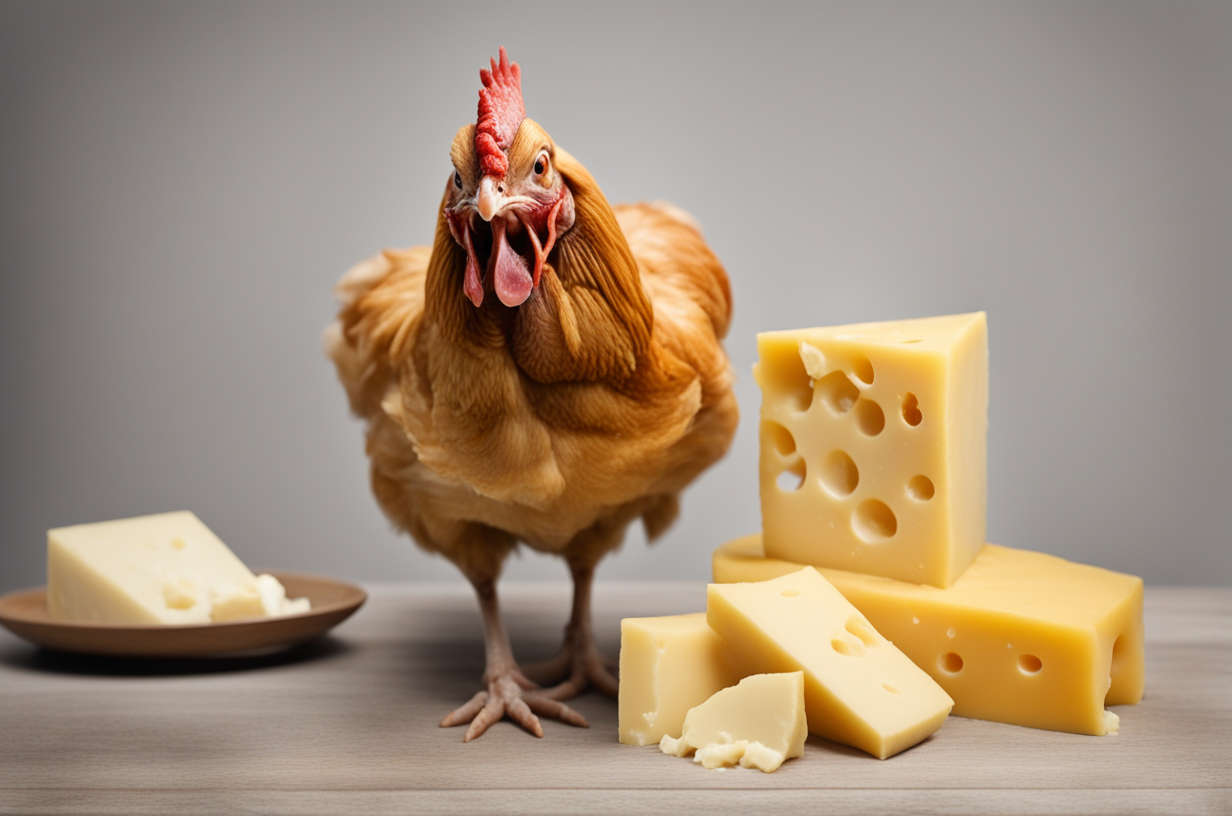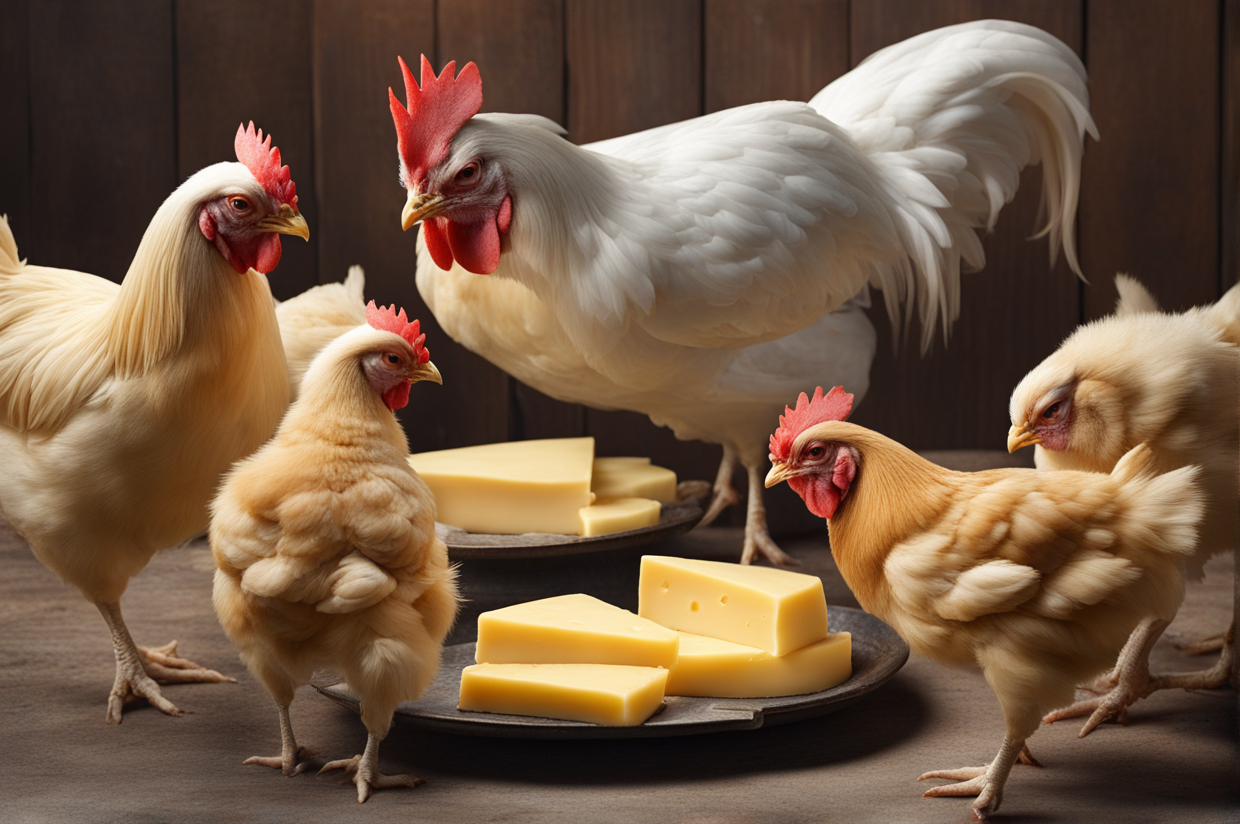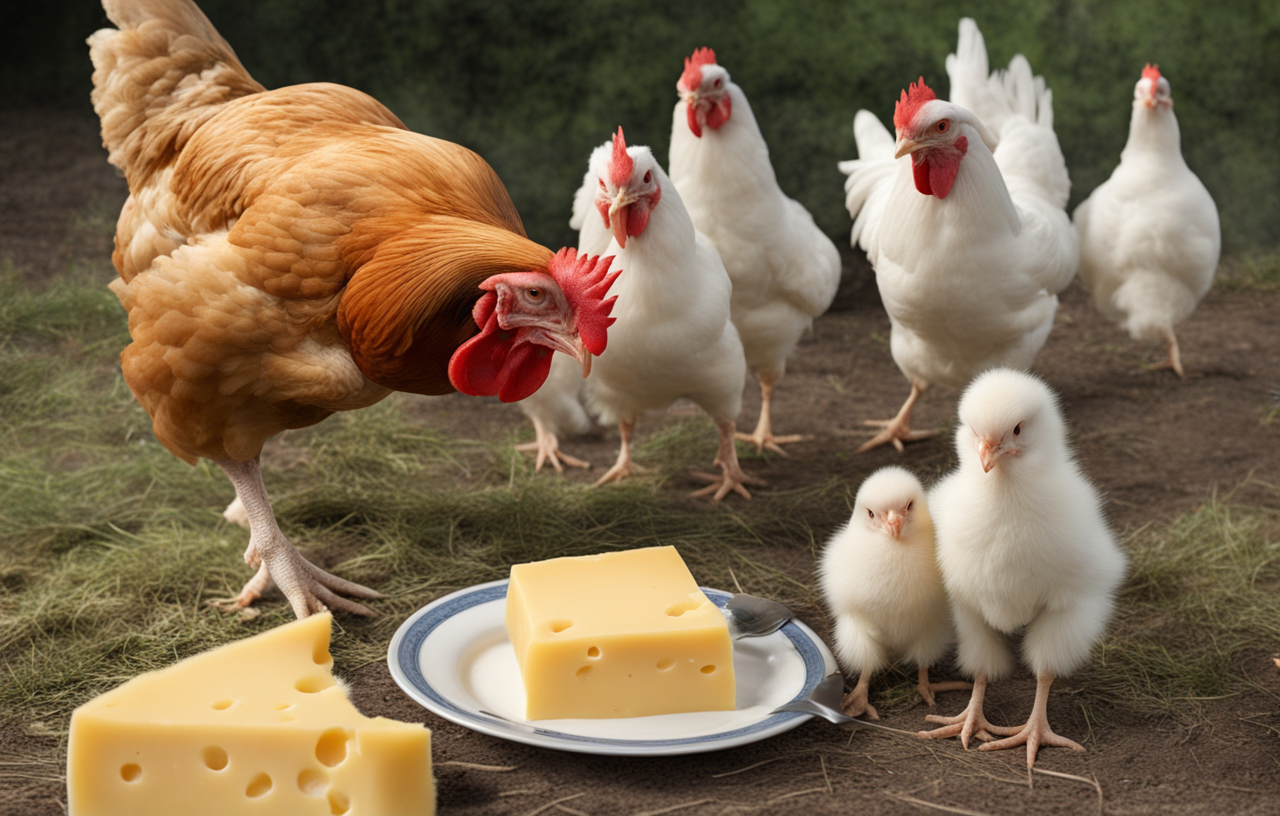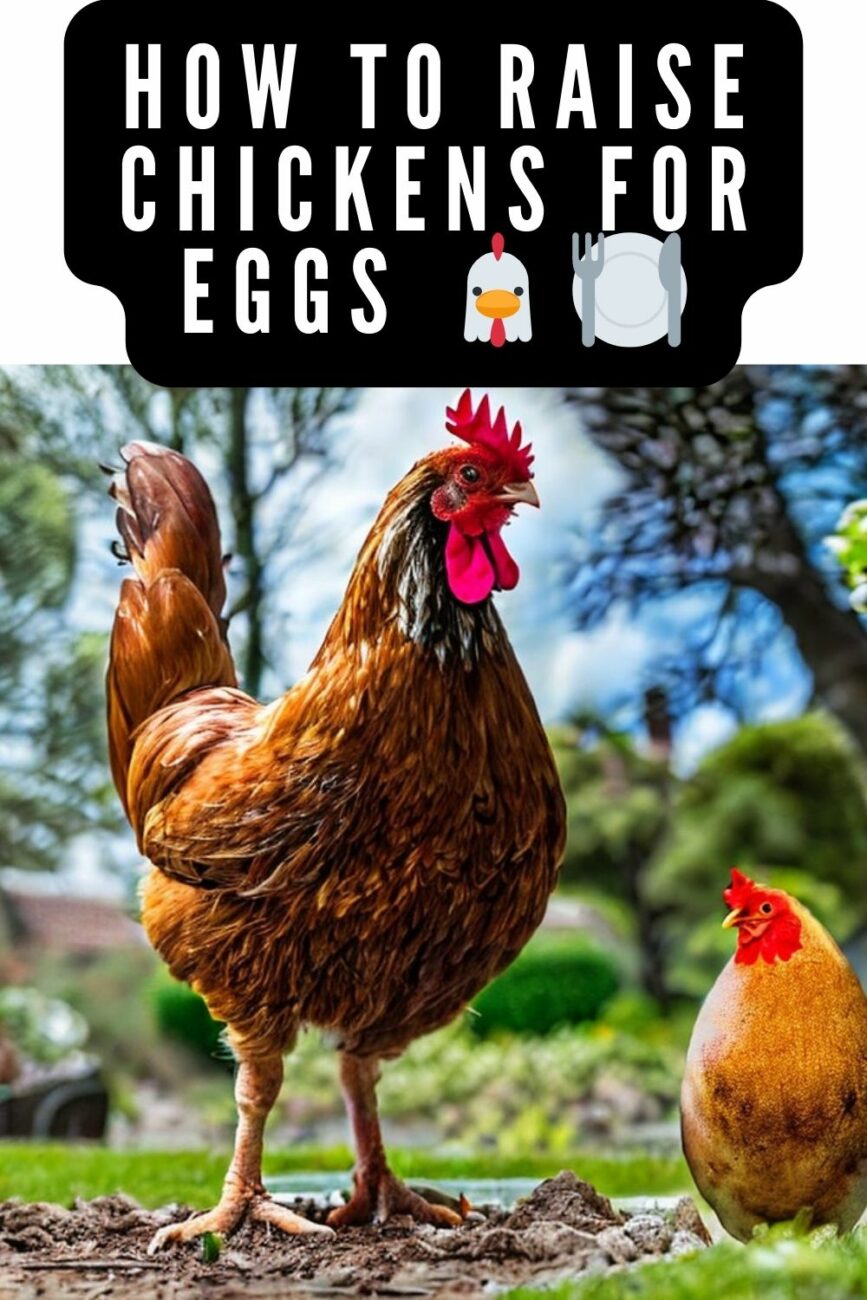I was out in the coop the other day collecting eggs when Clucky, my top hen, nearly pecked my hand off.
Turns out she could smell the cheddar cheese sandwich I had just wolfed down for lunch.
That got me wondering – can chickens eat cheese?
The short answer is yes, chickens can eat some types of cheese in moderation. Cheese can be a healthy treat for chickens due to its high protein and calcium content.
But hold on to your cowboy hats, because this isn’t just about cheese.
The plot thickens as I explore the intriguing question: Can chickens eat… chickens?
Let’s dive into this feathery mystery.
Table of Contents
Can Chickens Eat Cheese & Chickens?
Can chickens truly revel in the dairy delight that is cheese?
Without a doubt! Chickens can indeed indulge in the savory richness of cheese, but as with any treat, moderation is our guiding principle.

Imagine it like savoring a slice of decadent chocolate cake.
Too much, and you might find yourself in a state of culinary regret. The same goes for our feathered companions.
Here’s a detailed guide to serving cheese to your cherished flock:
- Moderation is Everything: Much like you wouldn’t make chocolate cake a staple in your daily diet (well, maybe you would, no judgment!), chickens should relish cheese as an occasional treat, not a daily feast.
- Stick to the Mild Stuff: Chickens, though not food critics, possess discerning taste buds. Opt for milder cheeses like mozzarella or cheddar, steering clear of overly fancy, pungent varieties that might lead to feather-ruffling disapproval.
- Mind Your Portions: A cheesy tidbit now and then is splendid, but transforming your coop into a dairy haven is a cluck no-no. Too much cheese can lead to disgruntled chicken tummies, and nobody wants a grumpy hen in the flock.
Imagine this: cheese becomes a gourmet delight for your feathered companions, much like you savoring a fine wine on special occasions. It’s a treat that adds a dash of excitement to their diet, elevating their culinary experience.
And here’s a thought: Your chickens, akin to discerning foodies, relish the occasional culinary surprise. A sprinkle of cheese here and there serves as a delightful seasoning, transforming an ordinary meal into a poultry feast!
Now, as we unravel the cheesy mystery, let’s pivot to the fascinating question of whether chickens can eat chickens.
The answer is nuanced.
While chickens are omnivores and may engage in cannibalistic behaviors if their diet lacks essential nutrients, it’s crucial to provide a balanced diet to prevent such practices.
So, yes, they can technically eat chickens, but it’s not a healthy or recommended practice. With that clarity, let’s continue our exploration into the delightful world of chicken and cheese.
Pro Tips for Poultry Parents: Navigating the Cheese Buffet
Now that you’re armed with cheesy wisdom, here are some pro tips to ensure your poultry party stays egg-citing:

- Grate for Greatness: Grate the cheese for easy pecking. It’s like creating a poultry-friendly cheese sprinkle – think of it as the chicken equivalent of your favorite sprinkle-on seasoning.
- Avoid Salty Surprises: Chickens don’t need a sodium overload, much like you after a binge-watch session. Opt for cheeses with lower salt content to keep your flock happy and healthy.
- Listen to Chicken Signals: If you notice any digestive distress, it’s time to put the cheese plate away. Happy chickens are the goal, not ones dealing with a case of the clucks.
Imagine this: serving cheese to your chickens is like hosting a dinner party.
You carefully prepare the dishes, ensuring each guest (or in this case, each chicken) has a delightful experience.
Grating the cheese is akin to offering a variety of toppings at a taco bar – everyone gets to customize their experience!
Remember, introducing cheese to your chicken’s diet is about enhancing their culinary experience, not causing a coop catastrophe. A sprinkle here, a nibble there – keep it light, keep it fun!
An Egg-cellent Fact About Chickens and Cheese
Here’s a fun fact about chickens and dairy products: feeding chickens small amounts of cheese can actually lead to richer-tasting eggs!

The nutrients from cheese like protein, healthy fats, and calcium get incorporated into the chickens’ diet.
Those nutrients then get passed on to the eggs in the form of darker, more vibrant orange yolks and richer flavor.
I first read about this from my friend Farmer Frank who has over 100 chickens on his family farm. He gives each hen just a pinch of grated parmesan cheese mixed into their feed once a week.
And he swears his hens lay the best, most decadent-tasting eggs around thanks to that cheesy boost!
So if you want delicious, restaurant-quality eggs from your backyard flock, consider sprinkling some cheese like parmesan, cheddar or swiss as an occasional treat. Just don’t overdo it to prevent weight gain!
Cheese Types Safe for Chickens
Alright, let’s really get into detail on what cheese varieties are safest and healthiest for chickens.
Here are the top cheese types I recommend offering chickens in moderation:
- Cheddar – A nice hard cheese that’s lower in fat. Grated cheddar makes a good protein sprinkle.
- Mozzarella – Low lactose levels make this a winner for chickens who are lactose intolerant.
- Swiss – An excellent source of vitamin D to keep chickens’ bones strong.
- Feta – Tangy, crumbly texture that chickens enjoy pecking at.
- Goat Cheese – Lower in lactose, plus provides probiotics for healthy digestion.
- Cottage Cheese – Lean and protein packed, just don’t give too much to avoid loose stool.
The healthy fats, digestible protein, and calcium in these cheeses make them suitable for chickens in conservative portions. Try grating harder cheeses for easier eating. The key is moderation – too much can lead to diet imbalance, GI issues, or weight gain that stresses little chicken legs.
Cheeses to Avoid
On the flip side, there are some cheese varieties that aren’t safe, healthy, or digestible options for chickens.
Be very cautious about feeding chickens:
- Soft cheeses like brie, camembert, ricotta, and cream cheese due to higher risk of bacteria like listeria or salmonella.
- Blue cheeses often contain roquefortine C, a toxin that can cause neurological issues.
- Moldy cheeses full of pathogens that can make chickens very sick.
- Processed cheeses pumped with preservatives, emulsifiers, salt and artificial colors.
- Cheese spreads and sauces which are too dense and sticky for chickens to safely swallow. Many are also too high in salt, fat or spices.
It’s best to avoid these cheese varieties altogether when feeding your flock. While they may have some nutritional value, the cons seem to outweigh the pros from my experience.
Serving Suggestions for Cheese & Chickens
If you want to share some chicken-safe cheese with your flock as an infrequent treat, please follow these tips to prevent issues:
- Give only tiny portions – a large chicken should get no more than 1 Tbsp of grated cheese at a time.
- Make sure cheese is cut up into pea-sized bites so chickens don’t choke trying to swallow a big hunk.
- Always supervise them while cheese snacking to monitor for aggression or choking incidents.
- Provide plenty of fresh water afterwards since cheese may increase thirst.
- Mix crumbles into feed instead of offering cheese solo to encourage well-balanced eating.
- Remove uneaten cheese after 30 minutes max so it doesn’t spoil and harbor bacteria in summer heat.
Oh and never leave unattended dairy products near a chicken coop or they’ll bock-bock-bock their way right into a cheesy disaster!
Using Cheese to Train Chickens
Want an easy way to train your chickens or get them to love you even more? Use tiny bits of their favorite cheeses as a positive reinforcement treat!
I first taught my chickens to come running to a special “snack call” sound by rewarding them with a pinch of grated cheddar whenever they approached me. After just a week, they’d come sprinting from across the yard as soon as they heard my “here chick chick” song.
You can use this same principle to train chickens to do all sorts of fun tricks through positive reinforcement with cheese:
- Come when called
- Perch on your finger or shoulder
- Walk through an agility course
- Ring a bell to come out of the coop
- Sit on command
- Navigate obstacle courses
- Let you pick them up
The key is to only reward them with a cheese nibble immediately after they demonstrate the desired behavior. Over time, they’ll connect the treat with the trick.
Mozzarella string cheese torn into tiny strips works great since it’s a jackpot protein treat they go nuts over. Just don’t give more than a piece the size of your pinky nail until the trick is mastered.
Cheese training sessions are also wonderful bonding time to boost chickens’ trust in you. Have fun with it and laugh at their silly antics – chickens can be remarkably smart when food is involved!
Cheesy Chicken Health Risks
While cheese can be a nutritious chicken treat in moderation, overdoing dairy treats can negatively impact chicken health.
Too much cheese can lead to:
- Obesity: Extra calories lead to weight gain, especially in confined or inactive chickens. Excess fat puts strain on the heart and joints.
- Diarrhea or loose stool due to lactose overload.
- Dehydration since cheese may cause increased thirst.
- Nutritional imbalance if too much cheese displaces balanced feed.
- Sour crop if lactose ferments.
On rare occasions, some specific cheese components may also pose toxicity risks:
- Tyramine – Ripened cheeses high in tyramine like aged cheddar can very rarely cause hypertension.
- Biogenic amines – Fermented cheeses like blue cheese contain histamine-like compounds that may impact circulation.
- Roquefortine C – Neurotoxin found in blue cheeses that can cause muscle tremors and paralysis. Extremely toxic to chickens.
But in small, occasional portions, most cheeses provide lots of protein with highly bioavailable calcium for strong eggshells and bone health.
Moderation is key – limit cheese to no more than 1 Tbsp per large chicken a few times a week maximum.
Cheesy Chicken Treat Recipes
Want to whip up some healthy homemade chicken treats using cheese? Here are a few yummy recipe ideas:
Baked Cheese Crackers
These crispy, protein-packed crackers are a hit with chickens!
- 1 cup chicken feed
- 1 egg
- 2 Tbsp olive oil
- 1/4 cup shredded cheddar
Mix ingredients into dough, roll flat & cut into small crackers. Bake at 350°F for 15 minutes. Let cool before feeding to chickens.
Cheesy Seed Nuggets
Chickens go crazy pecking for these pops of flavor and nutrition!
- 1 1/2 cups chicken feed
- 1 egg
- 1 Tbsp olive oil
- 1/4 cup shredded mozzarella
- 2 Tbsp mixed seeds like flax or sunflower
Form dough into quarter-sized nuggets and arrange on a parchment lined baking sheet. Bake at 400°F for 12-15 minutes until lightly browned. Cool fully before feeding to prevent burns!
Feta Yogurt Dip
Chickens love to peck at this tangy, cooling dip on hot summer days.
- 1 cup plain whole milk yogurt
- 1/4 cup crumbled feta cheese
- 1 tsp dried oregano
- 1 clove minced garlic
- Pinch of paprika
Mix ingredients until thoroughly combined. Spoon into a shallow dish and let chickens peck away!
The probiotics and protein give their digestive system a boost while the yogurt helps chickens stay hydrated. Plus they gobble it up!
Cheesy Behavior: Broody Hens & Roosters
Cheese can bring out interesting behaviors in broody hens trying to hatch eggs and aggressive roosters.
Broody hens are those who have a strong maternal instinct to sit on a clutch of eggs to hatch chicks. Their protective hormones kick into overdrive as they try to incubate eggs.
If you offer cheeses or other high protein foods near a broody hen, she will frantically call to her would-be chicks and attempt to gather the cheese to feed them!
It’s quite funny to watch them cluck urgently while trying to collect mozzarella balls or cheese cubes into their nest. But it also distracts hens from incubating real eggs which often fail to hatch if she leaves them to eat cheese snacks across the coop.
As for roosters, cheese can bring out aggression as they compete for the prized fatty, protein-packed morsels.
To avoid fights or injuries, only offer cheese to roosters separated from hens. And make sure weaker roosters aren’t bullied but still get their share.
In general, it’s best to minimize high value treats that seem to exacerbate bossy, territorial behaviors in roosters.
A Final Peck: Chickens Eating Chickens, Cheese, & Beyond
So, in conclusion, can chickens eat cheese? Absolutely! Just like you, they appreciate a tasty treat now and then. Treat your feathered friends to a cheesy delight, and revel in the joy that radiates from your clucking companions.
But when it comes to chickens eating chickens, it’s a bit more complex. While chickens are omnivores and may engage in cannibalistic behaviors, it’s crucial to provide a well-rounded diet to discourage such practices. So, no, it’s not recommended or healthy for chickens to eat each other.
Imagine this: your chicken coop, much like a cheerful café, is filled with content clucks and delighted coos as your feathered friends enjoy their cheesy indulgence. It’s a symphony of happiness, and you’re the conductor!
Now, go forth, dear poultry parent, and share the cheesy love with your feathered flock. Whether it’s mozzarella mania or cheddar cheers, your chickens will thank you with happy clucks and contented coos. Until next time, keep your coop cozy and your treats tasty!
